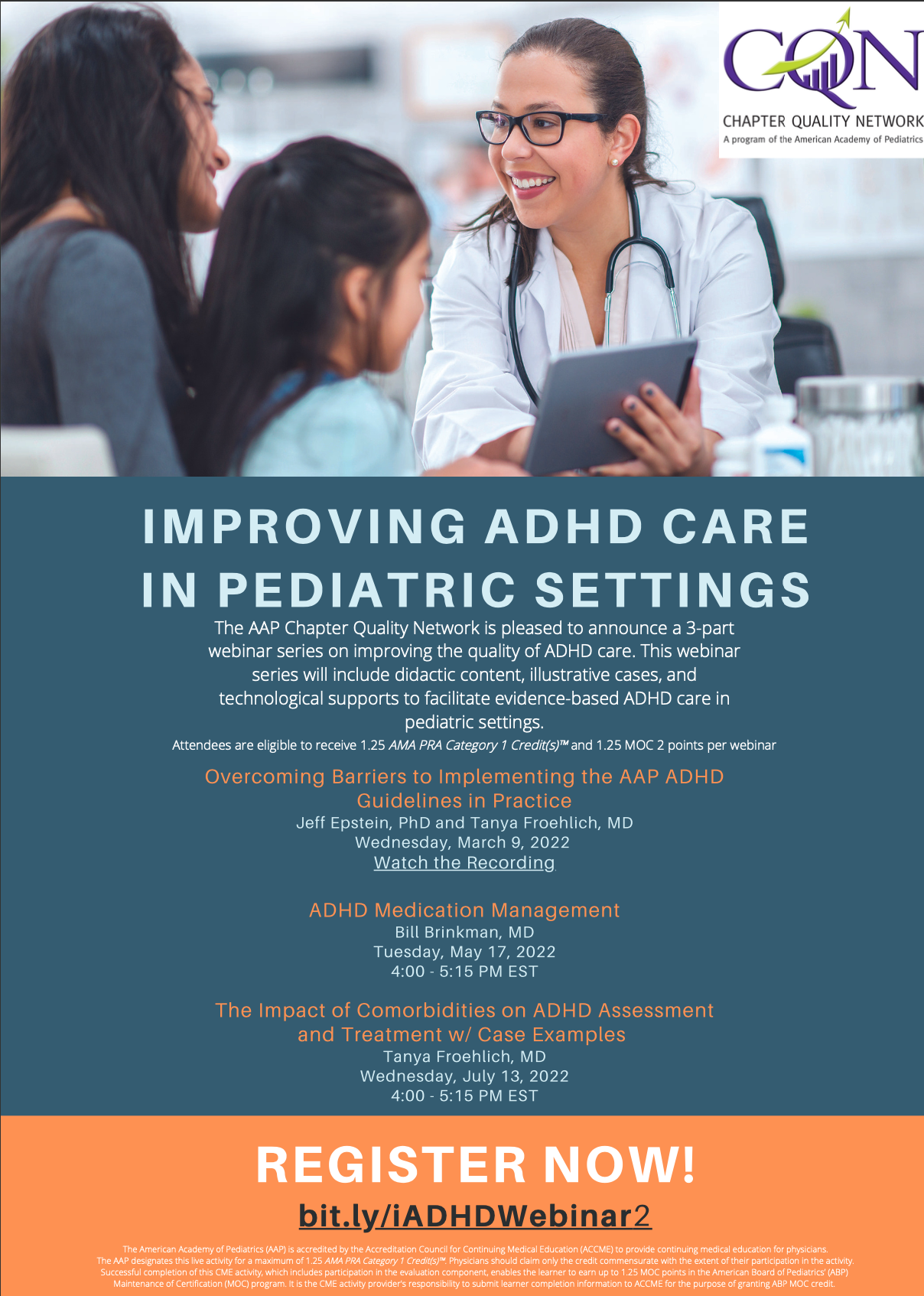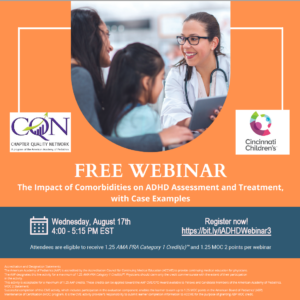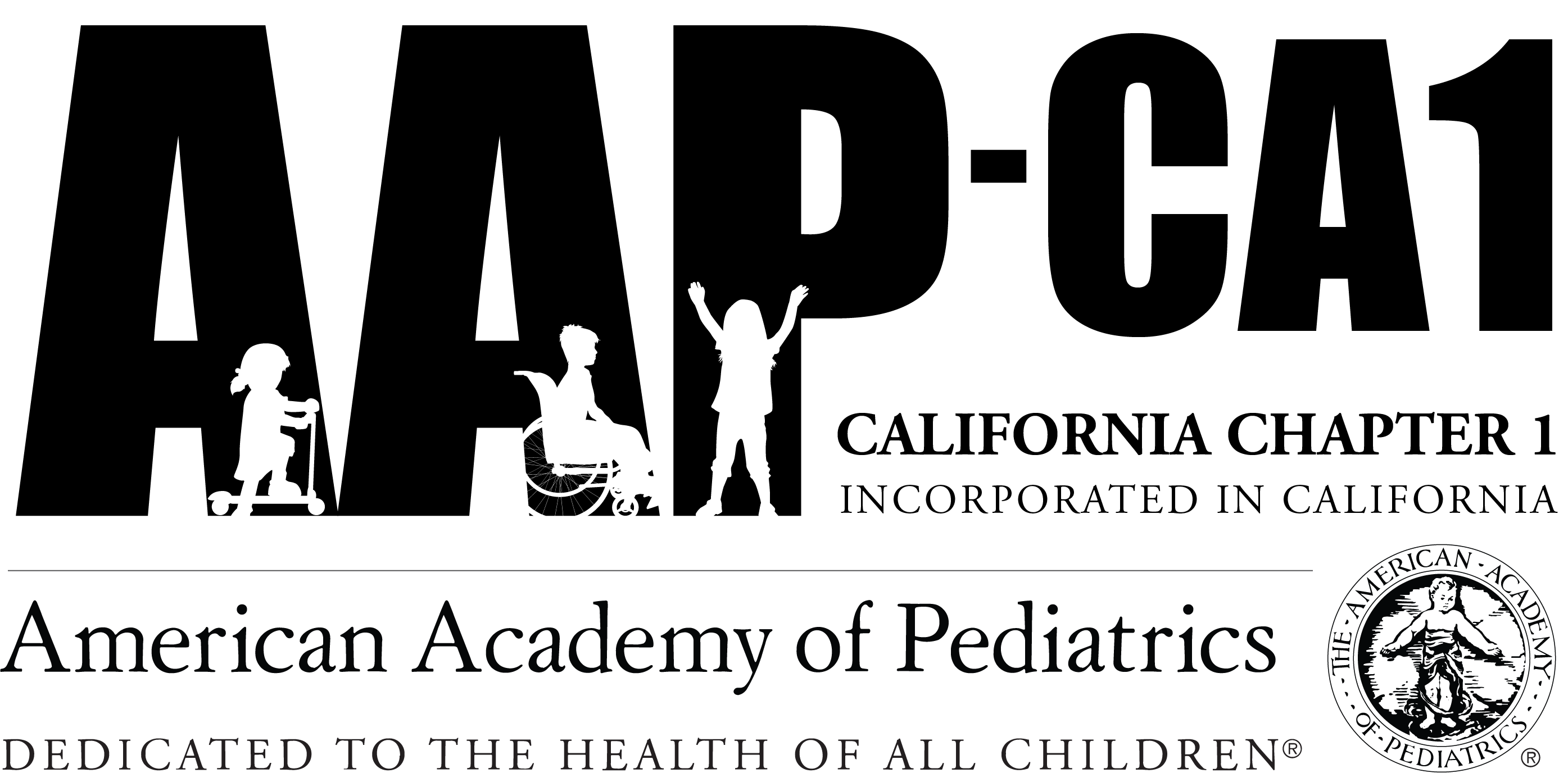
Improving ADHD Care in Pediatric Settings
Wednesday, August 17, 2022
1:00 pm - 2:15 pm
In collaboration with Cincinnati Children’s Hospital Medical Center, the AAP Chapter Quality Network is offering a 3-part webinar series focused on “Improving ADHD Care in Pediatric Settings.” This webinar series is for pediatricians and will focus on improving the quality of ADHD care using web-based tools such as mehealth for ADHD. This webinar series will include didactic content, illustrative cases, and the use of technological solutions to provide evidence-based ADHD care in pediatric settings. Physicians can earn CME, MOC2, and MOC4 credits through participation.

Webinar 3
The Impact of Comorbidities on ADHD Assessment and Treatment with Case Examples
(Postponed from July 13)
Wednesday, August 17
1:00 – 2:15 PM PST/ 4:00 – 5:15 PM EST
Register
Webinar Series to Help Providers Implement ADHD Guidelines
In collaboration with Cincinnati Children’s Hospital Medical Center, the AAP Chapter Quality Network is offering a 3-part webinar series focused on “Improving ADHD Care in Pediatric Settings.” This webinar series is for pediatricians and will focus on improving the quality of ADHD care using web-based tools such as mehealth for ADHD. This webinar series will include didactic content, illustrative cases, and the use of technological solutions to provide evidence-based ADHD care in pediatric settings. Physicians can earn CME, MOC2, and MOC4 credits through participation.
The rollout of this quality improvement effort is funded by the National Institute of Mental Health (NIMH), part of the National Institutes of Health. NIMH awarded Cincinnati Children’s a four-year $2.8 million grant to support the initiative, which focuses on accelerating improved patient outcomes at community-based and other practices where delivery of evidence-based ADHD care can be challenging, according to Jeffery Epstein, PhD, a pediatric psychologist and director of the Center for ADHD at Cincinnati Children’s.
Research shows that many pediatric practices carry heavy caseloads, and staff members struggle to coordinate care for complex behavioral conditions like ADHD. At the same time, the number of diagnosed cases of ADHD continues to increase, further straining practice resources. This makes it more difficult for pediatricians to stay current with American Academy of Pediatrics (AAP) care guidelines for ADHD.
Epstein is part of a team of pediatricians, behavioral specialists, and computer technology experts that developed the technology platform called “mehealth for ADHD.” A 2016 study published in the journal Pediatrics reported when tested at 50 community-based pediatrics practices involving 199 physicians and 577 children with ADHD, the mehealth for ADHD technology resulted in improved ADHD medication care and significantly better behavioral improvement in patients. Since that study was published, the mehealth system has expanded and improved by adding functions allowing parents and teachers to administer behavioral treatments.
“We already know it works to help pediatricians fine-tune their ADHD treatment regimens to achieve better symptom control for their patients within a shorter timeframe,” Epstein said. “Our focus now is to make this evidence-based intervention available nationwide where it can do the most good—improving the outcomes of millions of children throughout the country.”
Helping Epstein lead the ADHD rollout are: William B. Brinkman, MD, MEd, MSc, director of General and Community Pediatrics at Cincinnati Children’s, and Tanya E. Froehlich, MD, MS, FAAP, director of research for Developmental and Behavioral Pediatrics at Cincinnati Children’s.
Addressing a Common Condition
ADHD is one of the most common childhood disorders and can continue through adolescence and into adulthood, according to NIMH. Symptoms include difficulty staying focused, paying attention, difficulty controlling behavior, and hyperactivity.
The easy-to-access online “mehealth” technology portal uses standard Vanderbilt behavioral rating scales for children with ADHD. It allows parents, teachers, and others involved in a child’s care to offer behavioral assessments online according to schedules that are customized by the child’s pediatrician.
The information helps support a physician’s selection of behavioral medications, appropriate dosing and testing of other interventions. The information is then analyzed by computer algorithms in the portal technology to gauge the relative effectiveness of the care regimen by looking at how treatment affects outcomes.
Making Care Effective and Sustainable
Epstein and his colleagues will be working with participating practices and an advisory committee of parents, educators, and caregivers to find ways to enhance the portal’s financial sustainability, as well as its effectiveness. Through the current NIH grant, the team is able to offer the mehealth technology to pediatricians free of charge until October 2023. The ultimate goal, Epstein said, is to offer the ADHD care portal at no cost to pediatricians or families in perpetuity.
Note: the AAP does not endorse specific tools, but rather encourages pediatricians to use a tool that meets the needs of their practice.
- The American Academy of Pediatrics (AAP) is accredited by the Accreditation Council for Continuing Medical Education (ACCME) to provide continuing medical education for physicians.
- The AAP designates this live activity for a maximum of 1.25 AMA PRA Category 1 Credit(s)™. Physicians should claim only the credit commensurate with the extent of their participation in the activity.
- This activity is acceptable for a maximum of 1.25 AAP credits. These credits can be applied toward the AAP CME/CPD Award available to Fellows and Candidate Members of the American Academy of Pediatrics.
- PAs may claim a maximum of 1.25 Category 1 credits for completing this activity. NCCPA accepts AMA PRA Category 1 Credit™ from organizations accredited by ACCME or a recognized state medical society.
- This program is accredited for 1.25 NAPNAP CE contact hours of which 0 contain pharmacology (Rx), (0 related to psychopharmacology) (0 related to controlled substances), content per the National Association of Pediatric Nurse Practitioners (NAPNAP) Continuing Education Guidelines.
- Successful completion of this CME activity, which includes participation in the evaluation component, enables the learner to earn up to 1.25 MOC points in the American Board of Pediatrics’ (ABP) Maintenance of Certification (MOC) program. It is the CME activity provider’s responsibility to submit learner completion information to ACCME for the purpose of granting ABP MOC credit.
FAQs Regarding CME Credits
- Learners must attend the live event to receive CME credit. For those who are unable to attend the live webinar, they may watch the webinar recording to be eligible for CME credit.
- In order to receive the link to the recording, they must register for the webinar.
- For those physicians who are also seeking the MOC2 credit, they must complete the MOC2 quiz that is distributed after the webinar and receive a passing score of 80% or higher. The quiz can be taken as many times as needed to obtain that score.
- Participants will have a total of one week after the webinar to watch the recording for CME and complete the quiz for MOC2.
Past Webinars:
ADHD Medication Management
Tuesday, May 17, 2022
4:00 – 5:15 PM EST
Overcoming Barriers to Implementing the AAP ADHD Guidelines in Practice
Wednesday, March 9, 2022
4:00 – 5:15 PM EST
